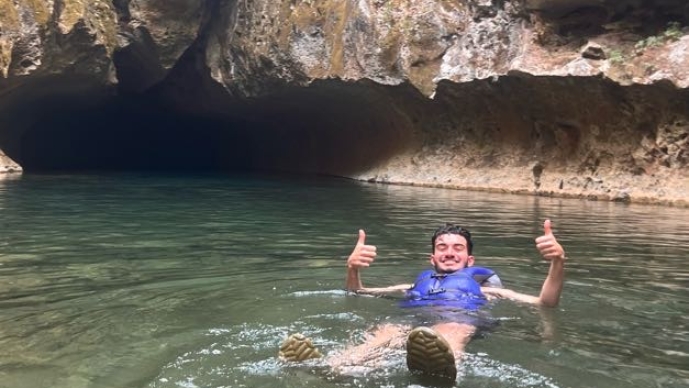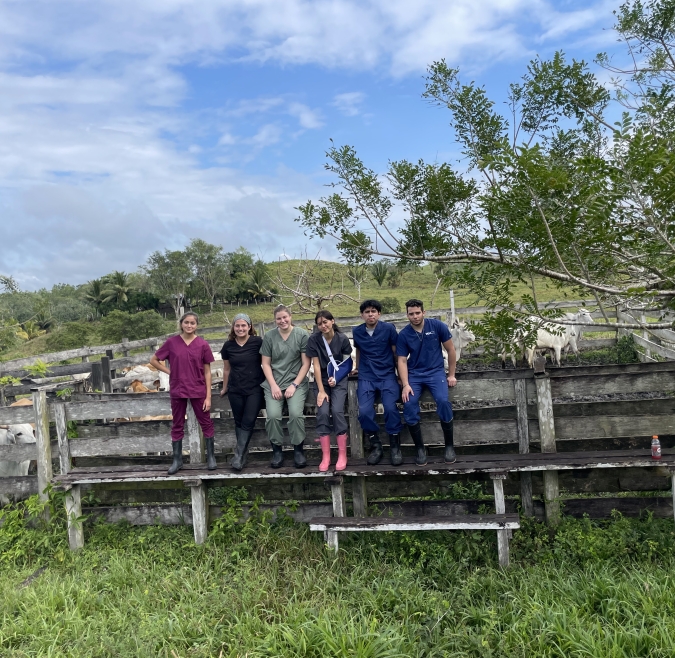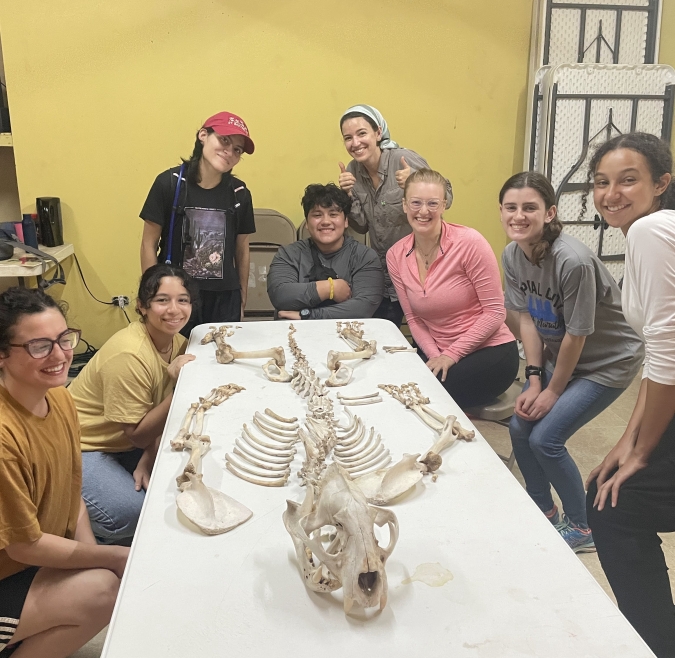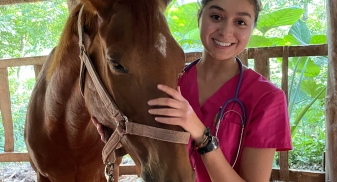Winter: CELA Belize
The Program
Get your hands dirty!
Depending on your program choice, you’ll gain a working knowledge of contemporary clinical vet skills, participate in cutting-edge conservation research practices, or dive into Belize's unique reef system.
Travel to Belize to study large animal veterinary practices, wildlife conservation, or a combination of offerings through CELA's hands-on courses.

Program Location
San Ignacio
San Ignacio
San Ignacio is the second largest city in Belize (after Belize City), and is the home of the Center for Engaged Learning Abroad (CELA). The city got its start as a mahogany-producing center under British colonial rule, but has since branched out to other fields, including ecotourism. Students will use San Ignacio as their launching point for learning about local issues related to conservation, animal health, ecology, and more, as well as the impact these issues have on global events. San Ignacio is rich in culture and history, with Mayan Ruins, museums, views from El Castillo Pyramid, canoe trips to Barton Creek, walking trails, natural swimming pools, and beautiful rain forests.
The Large Animal Health program will take place on local farms around San Ignacio. The Wildlife Health and Conservation program is based primarily in Belmopan and will visit several conservation projects in the area and an overnight beach trip. The Marine Ecology program is located on San Pedro and students will take the ferry there as soon as they arrive in Belize.

Belize
Large Animal Veterinary Practice in the Tropics
This course is designed for the veterinary, pre-veterinary, animal science, or zoology students to gain a working knowledge of husbandry, and health issues confronting farm animals including horses, sheep, pigs, and cattle in Belize. Students get the opportunity to learn hands-on veterinary examination techniques at working ranches and farms, as well as learn about animal agriculture in Belize, including analyzing laboratory specimens in a laboratory. Lectures focus on the selection, nutrition, reproduction, and management of horses, beef cattle, goats, swine, and sheep. Other topics taught in this course include animal anatomy and physiology, animal agriculture economy, animal diseases, and animal research. Students participate in a local animal health clinic, practicing their new skills and assisting in spay and neuter procedures.
For more information, including a course syllabus, please click here.

Belize
Wildlife Health, Ecology and Conservation
Students will visit several wildlife and conservation sites around Belize! Spend several days working alongside zookeepers in the world-renowned Belize Zoo, visit a raptor rehabilitation center, hike through a private wildlife reserve, and see the oldest Mayan cave drawings. The focus of the course is on wildlife conservation, and research methods. Species-specific focus will include the research and conservation of the jaguar (Panthera onca) and puma (Puma concolor), tapir (Tapirus bairdii), jabiru stork (Jabiru mycteria), howler monkeys (Alouatta pigra), spider monkey (Ateles geoffroyi) and the green iguana (Iguana iguana). Students will gain insight on several field research techniques including specialized leg hold traps, cage traps, GPS and VHF tracking, camera trapping, chemical immobilization and remote drug delivery, avian mist netting, bird banding, and nest searching and monitoring. Students will also get the opportunity to observe and collect data on captive and wild animals and .will assist in a one-day spay-neuter clinic for the local community.
For more information, including a course syllabus, please click here.
Belize
Tropical Marine Ecology and Conservation
The focus of this course is to learn the key biotic and abiotic components of a coral reef system and how they interact. Students will explore the current state of the Belize Barrier Reef and how human activity impacts the marine ecology and ecosystems in general. The biological and ecological history of this reef system will be used to inform attempts to predict its future under varied management strategies. Students can expect to spend up to eight hours a day on the boat and in the water. Lectures will encompass uninformed human activities locally and globally that can be addressed to achieve a more positive outcome for coral reefs. The Belize Barrier Reef is home to a large diversity of plants and animals and is the second largest coral reef system in the world after the Great Barrier Reef in Australia! With 90% of the reef still needing to be researched, it is estimated that only 10% of all species have been discovered.
For more information, including a course syllabus, please click here.
Academics
Rutgers University has partnered with CELA Belize to offer two programs for students interested in traveling abroad to Belize during the winter:
Large Animal Veterinary Practice in the Tropics
Wildlife Health, Ecology and Conservation
Students will register for one three-credit course at CELA.
Courses listed above have been approved as Rutgers credits, meaning that if you take these courses, the price listed below will appear on your term bill and the credits will transfer back as Rutgers credits. If you wish to apply for a course offered by CELA that does not appear above, you will be responsible for paying CELA directly for the appropriate amount and working through your department to receive transfer credit. Please contact the program manager (listed at the top of this page) if you have any questions.
For information about study abroad credit transfer, registration, and transcripts please visit the Academic Planning tab on our website, located in the students section. You can also visit the Course Equivalency Database, as well as Course Equivalency Guidelines.
School of Environmental and Biological Sciences (SEBS) course equivalencies:
Large Animal Veterinary: Approved for Animal Science Study Abroad Experience Based Education Equivalent (Pass/No Credit)
Wildlife Health: Approved for Animal Science Study Abroad Experience Based Education Equivalent(Pass/No Credit)
Marine Ecology: Approved for Environmental Science Elective OR Study Abroad Experience Based Education Equivalent; Approved for Marine Science Study Abroad Experience Based Education Equivalent (traditional grading scale)
Housing and Meals
San Ignacio is the second largest city in Belize (after Belize City), and is the home of the Center for Engaged Learning Abroad (CELA). The city got its start as a mahogany-producing center under British colonial rule, but has since branched out to other fields, including ecotourism. Students will use San Ignacio as their launching point for learning about local issues related to conservation, animal health, ecology, and more, as well as the impact these issues have on global events. San Ignacio is rich in culture and history, with Mayan Ruins, museums, views from El Castillo Pyramid, canoe trips to Barton Creek, walking trails, natural swimming pools, and beautiful rain forests.
The Large Animal Health program will take place on local farms around San Ignacio. The Wildlife Health and Conservation program is based primarily in Belmopan and will visit several conservation projects in the area and an overnight beach trip. The Marine Ecology program is located on San Pedro and students will take the ferry there as soon as they arrive in Belize.
- Large Animal: Students will be housed at the Rumors Resort just outside of the city center of San Ignacio. Breakfast is provided as part of your program fee each weekday, but all other meals are the responsibility of the student. Airport pickup is included.
- Wildlife Health: Students will be housed at the TEC, about one mile from the Belize Zoo. There is no AC or WiFi in the rooms but there is WiFi in the common area. Breakfast and dinner are included each day. Lunch is the responsibility of the student. Airport pickup is included.
- Flight directions are provided on CELA’s Current Student Site found in their acceptance email.
Food in Belize:
Belizean cuisine consists of both local and imported dishes. Over the course of your stay in Belize you will be able to try traditional Belizean meals, Mexican dishes, Central American inspired dishes, Caribbean, American and some European cuisines. For instance, breakfast might consist of a Belizean Fried Jack (a fried dough) with eggs, beans and fruits or vegetables. Lunch might be salbutes and a natural fruit juice, and dinner served up as the famed Belizean Rice and Beans. The food is great, so feel free to indulge in all the different tastes.
Financial Information
Program Costs
| NJ Resident | non-NJ Resident | |
|---|---|---|
| Large Animal Vet | $4,060 | $4,520 |
| Wildlife Health | $4,080 | $4,540 |
Program Cost includes:
• Tuition
• Housing
• Some meals
• Excursions
• Airport transfer
• Administrative Fees
• On Call International Insurance
* The winter session student fee is not included in the program cost above.
Out-of-Pocket Costs
| Airfare | $900 |
| Additional Meals | $250 |
| Local Transportation | $25 |
| Personal Expenses | $200 |
| Total | $1,375.00 |
Out-of-Pocket Cost includes:
The above costs are estimations and represent the known out-of-pocket costs students encounter during their time abroad.
Some of these expenses will be paid for prior to going abroad, such as an airline ticket and visa costs, while some of these expenses, such as meals and local transportation, will be paid in-country as part of your daily expenses. As you plan, you will need to budget these costs and spend wisely throughout your time abroad.

